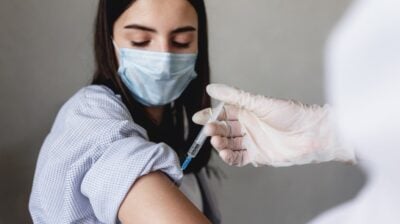What is PMDD?
Premenstrual dysphoric disorder (PMDD) is a severe form of premenstrual syndrome (PMS).

Premenstrual dysphoric disorder (PMDD) is a severe form of premenstrual syndrome (PMS). PMDD can cause depression, anxiety, and other physical and mental health symptoms during the two weeks leading up to your period. These symptoms can be so extreme that they get in the way of your daily life, like work, school, or relationships. PMDD symptoms usually go away once your period starts or a day or two after.
What causes PMDD?
It’s not yet known what exactly causes PMDD, but scientists think it’s connected to the hormonal changes that happen during your menstrual cycle and a chemical in your brain that affects mood called serotonin.
What are the symptoms of PMDD?
Most people who menstruate have some PMS symptoms, like cramps, bloating, breast tenderness, or mood changes before or during their period. Often, PMS takes a little extra self-care to manage. With PMDD, the symptoms are much worse, causing big problems in your daily life.
PMDD symptoms are experienced severely in the weeks leading up to your period, but then will stop once your period begins. If you have any of the following symptoms, and they consistently happen to you in the week or two leading up to your period (or become a lot worse then), talk with your GP or sexual health professional about PMDD.
Symptoms of PMDD include:
- Depression
- Nervousness or anxiety
- Panic attacks
- Severe mood swings
- Suicidal thoughts or feelings
- Feeling very tired
- Not being able to sleep
- Trouble staying focused
- Breast tenderness
- Headaches
- Cramps
- Joint pain
- Bloating
- Food cravings
How is PMDD treated?
If you think you have PMDD, your GP or sexual health professional will likely ask you to keep track of your period symptoms over the course of a few months. They may do a blood test or other tests or exams to rule out other causes of your symptoms. They may also ask you questions about any history of anxiety or depression you might have had in the past.
There is no single PMDD treatment or PMDD medication that works for everyone.
Your doctor or sexual health professional will talk with you about your options, which may include:
- Hormonal contraception
- Over-the-counter pain medicine like ibuprofen or paracetamol
- Diet changes and regular exercise
- Stress management tools like meditation and other self-care
- Antidepressants
If you’re having a hard time dealing with emotional symptoms like depression or anxiety, it’s a good idea to get help right away from a mental health professional.
Feeling overwhelmed and want to talk to someone?
- Get anonymous support 24/7 with our text message support service
- Connect with a trained volunteer who will listen to you, and help you to move forward feeling better
- Whatsapp us now or free-text SPUNOUT to 50808 to begin.
- Find out more about our text message support service
If you are a customer of the 48 or An Post network or cannot get through using the ‘50808’ short code please text HELLO to 086 1800 280 (standard message rates may apply). Some smaller networks do not support short codes like ‘50808’.






